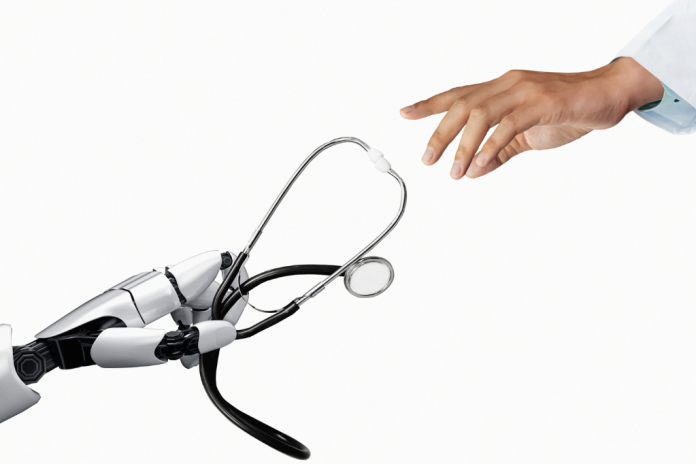Since the evolution of mankind, we have always believed that humans are the greatest creation on earth. No technology can take over human’s effort. Humans have created machines to make our work easier.
To reduce the human effort few technologies were developed. With some advancement these technologies have taken a shape that is replacing humans.
Robotics and AI are two such technologies that have started learning human trends and responses. These two technologies have impacted several industries and sectors across the economy. Healthcare is one such sector where these two technologies have made a significant impact.
Healthcare industry has seen several revolutions in last decade. Robotics has improved the standard of quality and safety in healthcare.
Since 1985 the emergence of precision machines was planned to do surgery and beyond. But in the 21st century the robo-doctors developed with artificial intelligence which can even learn from doctors and can even outperform them.
Robo-doctors can create knowledge and medical repository to perform surgery, give medical assistance, and give care to patients.
Robotics is taking over all the tasks performed in the healthcare industry. Let us take a quick view ofhow are robots used in the healthcare industry?
Uses of robots in the healthcare industry
Robots are already the part of healthcare industry and paved the path of raising the current standard of care and medical assistance. Since the last decade robotics is an inseparable part of healthcare industry. From the development of drug to remote diagnosis to virtual assistance.
No matter how precise the robots were in past it was considered that they cannot replace humans. But with the addition of Artificial Intelligence and Machine learning these precise machines are capable of performing a variety of tasks in healthcare industry.
Surgical Robots
Many healthcare machine manufacturers focus on developing robots that can perform surgery with the precision of a human doctor. These manufacturers are developing robots that can perform minimally invasive robotic surgery.
Types of robots used in surgery
Da Vinci system: this general robotic system that is capable of performing surgical procedures in Urology, Bariatric, gynecological.
MAKO System: this kind of robot is capable of performing Orthopedic, partial and complete knee replacement surgery.
ROSA system: this stands for robotic operational surgical assistance.
Exoskeletons
It detects the electric signals from the patient’s body with use of sensors placed on the skin. It assists patients in rehabilitation from disorders in the lower limb, spinal cord injuries, Strokes etc.
Care Robots
These robots are significantly rising in healthcare sectors to look after elderly patients. Specifically Japan is looking to increase the number of these robots as Japan is facing a significant loss of care-staffs in its hospitals.
It helps patients to get in and out of their bed, alarm them when to take medicine and nap etc.
These robots help in performing routine tasks such as taking blood samples, recording temperature, improving patient’s hygiene.
Robear Japanese is one example of such a robot developed by RIKEN and Sumitomo Riko.
Hospital Robots
Hospital robots are complex machinery developed to perform tasks like delivering medications, taking laboratory specimens, and managing patient’s appointment. TUG autonomous mobile robot is one such example of hospital robots developed by Aethon.
It has an inbuilt map and an array of board sensors to navigate. It uses wifi-communication, elevators, fire alarms, and automatic doors.
Medical Device Packaging
Sterilization and minimal human contact are important in packaging of medical devices, surgical instruments, and medicines.
The use of robots has also optimized the processes and fastens the operations of medical supplies.
Lab Automation
Robotics is a great help in automating medical labs. Laboratory robotics is the way of using robotics in bio-labs. As these laboratory composes of repetitive movements so the robotic automation is best suited for these processes.
Many of such robots are often called robo-samplers as they provide continuous samples for analytical devices.
Cutting Bone
Cutting bone referred to as bone ablation which means using heat to treat a benign bone growth called an Osteoid Osteoma. The abnormal area is very painful so robots are used to cut the benign bone growth to relief the pain called Laser Bone Ablation.
Physiotherapy
Robots referred to as Cobots are used by physiotherapists to give therapeutic massages to patients and relieving the burdened clinics from their workloads.
How robotics improving the healthcare Industry
For a decade now robotics are helping doctors and nurses to take good care of patients by automating the processes and assisting patient care. Following are the way in which robotics has improved Healthcare Industry;
Precise Diagnosis
The real use of AI in labs and clinics is visible. Robotics helps in detecting the patterns, studies various conditions, and uses different correlations to give precise prescriptions.
Example: An endoscopic system from Japan detects colon cancer with 86% accuracy.
Remote Treatment
With the introduction of 5G the communication system in such robots are improving their accuracy. This has improved remote treatments with patient’s hygiene.
Supporting Daily Tasks
It is assisting nurses and caregivers to do repetitive tasks. Such as collecting samples, recording temperature, giving medications etc. and reducing the workload.
Conclusion
Robotics in healthcare industry is a gift of mankind. It not just assists doctors and caregivers to take good care of patients, but also improves the standard of quality of care.
Robotics not just performs routine tasks but also precisely conduct independent surgeries and micro surgeries.
In many cases robotics have outperformed best doctors in terms of accuracy, so these micro-robots are called Perfect Surgeons.
Robotics has impacted the whole healthcare industry. Lab automation and medical daily supports have made it more effective for humankind.
Robotics in healthcare industry is still holding lots of potential and it will continue being the support in saving lives.
You May Also Like:

